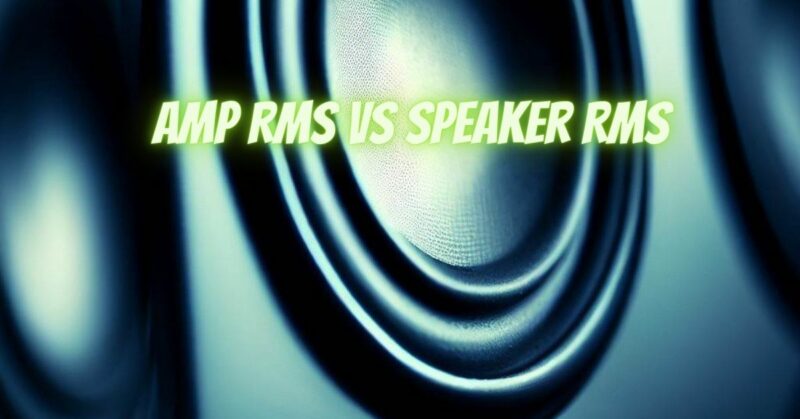When choosing an amplifier for your speakers, it is important to understand the difference between amp RMS and speaker RMS. RMS stands for root mean square, and it is a measure of the average power that a speaker or amplifier can handle without being damaged.
- Amp RMS: The RMS rating of an amplifier is the amount of power that it can provide continuously. This is the amount of power that the amplifier will be providing most of the time.
- Speaker RMS: The RMS rating of a speaker is the amount of power that it can handle without being damaged. This is the amount of power that the speaker will need to reach its full potential.
It is important to match the RMS ratings of the amplifier and the speakers. If the amplifier is not powerful enough, the speakers will not be able to reach their full potential. They may also sound distorted or muddy. If the amplifier is too powerful, it can damage the speakers.
Here are some tips for matching amp RMS to speaker RMS:
- Check the RMS ratings of the speakers: The RMS rating of the speakers is usually printed on the speaker itself or in the speaker’s specifications.
- Choose an amplifier with an RMS rating that is equal to or greater than the RMS rating of the speakers: For example, if the speakers have an RMS rating of 100 watts, you should choose an amplifier with an RMS rating of at least 100 watts.
- Consider the impedance of the speakers: The impedance of the speakers is also important to consider. The impedance of the speakers and the amplifier should be matched.
- Consult with a professional: If you are not sure how to match amp RMS to speaker RMS, it is best to consult with a professional audio technician. They can help you choose the right amplifier for your speakers.
By following these tips, you can help to ensure that your speakers sound their best and avoid damaging them.
Here are some additional things to keep in mind when matching amp RMS to speaker RMS:
- Peak power: The peak power rating of an amplifier is the maximum amount of power that the amplifier can provide for a short period of time. The RMS rating is more important than the peak power rating when choosing an amplifier, as the speakers will be operating at their RMS rating most of the time.
- Clipping: Clipping is a type of distortion that occurs when an amplifier is unable to provide enough power to the speakers to reproduce the audio signal accurately. This can cause the speakers to produce unwanted sounds, such as buzzing or crackling.
- Overheating: If the amplifier is providing more power than the speakers need, it may overheat. This can damage the amplifier and the speakers.
By understanding these factors, you can better determine how much power you need to provide to your speakers.
Ultimately, the best way to determine whether you have matched amp RMS to speaker RMS correctly is to listen to them together and make sure that they sound good to you.


